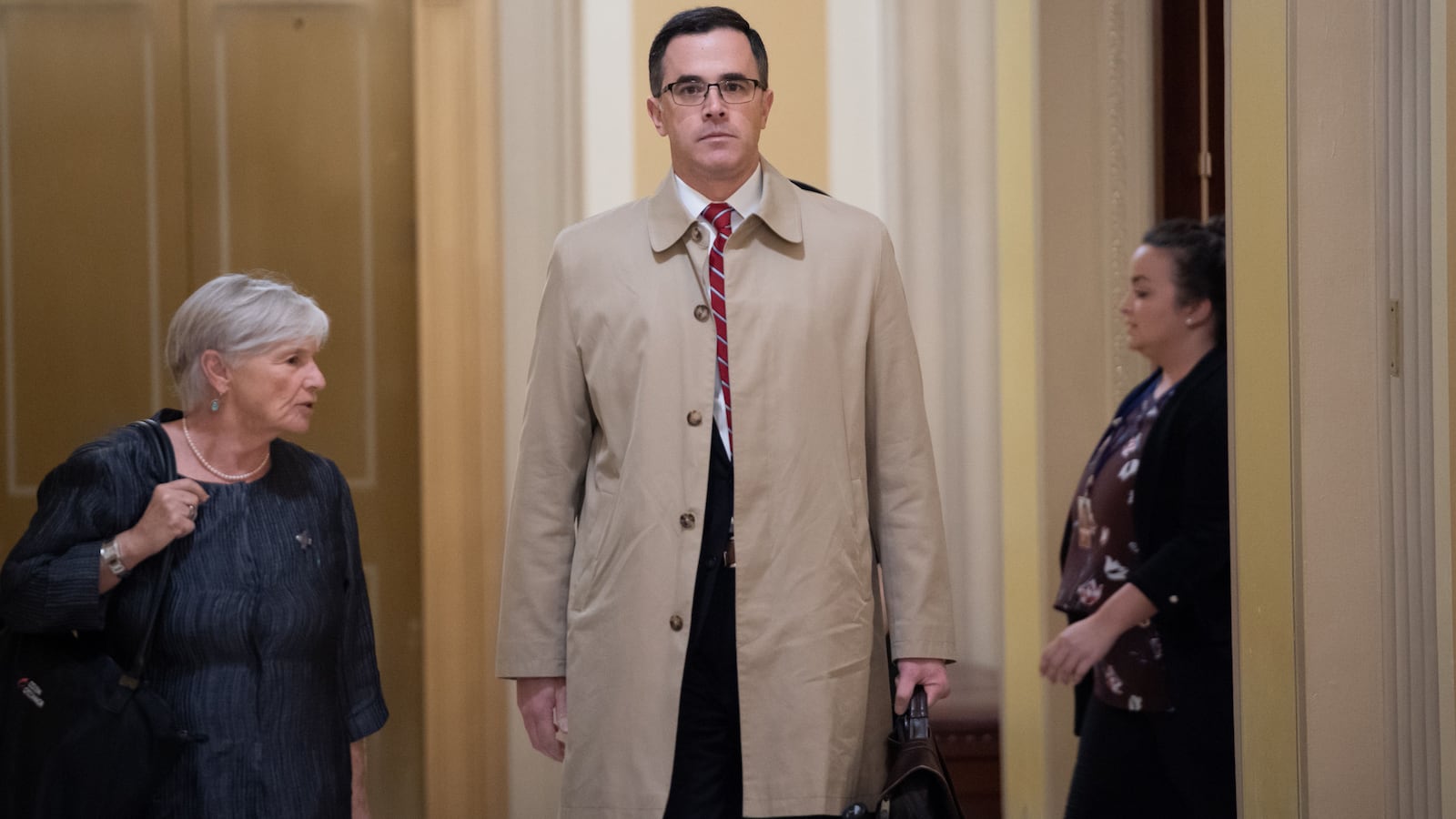Tim Morrison, a senior White House official who listened to President Donald Trump's controversial call with Ukraine’s President Volodymyr Zelensky, said he did not worry Trump broke the law on the call. He also said he was not aware of any meaningful material being left out of the White House’s memo on the call.
“I want to be clear, I was not concerned that anything illegal was discussed,” he said in a prepared statement to Congress obtained by The Daily Beast.
After the call between Zelensky and Trump took place, Morrison directed that the transcript of it be put on a secret White House server. He said that the memo the White House released about the call is, to the best of his memory, complete and thorough. Another witness, NSC official Alex Vindman, suggested that noteworthy parts of the conversation were missing from the White House’s memo.
Those dual statements from Morrison may prove to be a setback for Democrats who have argued that the call amounted to an impeachable offense since it involved the president demanding an exchange of a political favor for military aid.
Morrison, who served as the senior director for European affairs on the National Security Council until his resignation on Wednesday, says he had a different recollection of events than what Ambassador Bill Taylor described in his Oct. 22 testimony—including an episode that appeared to indicate the high expectations that Trump and his team had for Zelensky’s commitment to investigating the Bidens.
In his testimony, Taylor recounted a conversation in which Morrison briefed him on another conversation between Ambassador Gordon Sondland and a top adviser to Ukrainian president Volodymyr Zelensky. Taylor said Morrison informed him that Sondland, the U.S. ambassador to the European Union at the heart of the impeachment inquiry, told Zelensky-aide Andriy Yermak that U.S. security aid wouldn’t come until Zelensky publicly committed to an investigation into Burisma, the company on whose board Hunter Biden served.
That is not how Morrison remembers it. “My recollection is that Ambassador Sondland’s proposal to Yermak was that it could be sufficient if the new Ukrainian prosecutor general, not President Zelensky, would commit to pursue the Burisma investigation,” Morrison told impeachment investigators.
Morrison concluded his opening remarks with something that GOP lawmakers have noted frequently: that the hold on Ukraine’s security aid ultimately was released. “I am pleased our process gave the president the confidence he needed to approve the release of the security sector assistance,” said Morrison. “My regret is that Ukraine ever learned of the review and that, with this impeachment inquiry, Ukraine has become subsumed in the U.S. political process.”
On Thursday morning, Republicans hinted that Morrison’s testimony might undermine aspects of the narrative Democrats have constructed on impeachment so far. They noted that his opening statement had not yet surfaced, as it frequently had with other witnesses in the inquiry.
But other parts of Morrison’s opening statement did seem to bolster the idea that Trump was applying a pressure campaign on the Ukrainians through a non-official channel. Morrison noted that his predecessor, former national security official Fiona Hill, had told him that Sondland and the president’s personal lawyer Rudy Giuliani "were trying to get President Zelensky to reopen a Ukrainian investigation into Burisma.” Morrison went on to say that “At the time, I did not know what Burisma was or what the investigation entailed.”
“I did not understand why Ambassador Sondland would be involved in Ukraine policy,” he added.
Morrison was slated to be the first senior White House official to testify to the impeachment inquiry, but he resigned just hours before his appearance. On the eve of his testimony on Thursday, NPR broke the news that he would be leaving the post after less than two years on the job.
A senior administration official quoted by The Washington Post said in a statement that Morrison had “decided to pursue other opportunities—and has been considering doing so for some time.”
However, Morrison’s appearance still comes in defiance of a White House directive that officials not cooperate with the probe, and congressional officials said that he appeared for testimony after being issued a subpoena.
Morrison’s testimony occurred as the House took a vote to formally codify the impeachment investigation and bring it into a so-called “public” phase.








